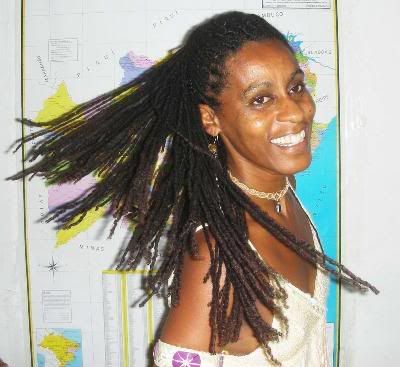
My Wife, Teresa Francisco Holland, Does Not Straighten or Iron Her African Hair, Letting Her Dreads Swing Naturally.
In a post about discovering that she had never valued being Black, Bronze Trinity blog discusses everything from hairstyles to a Canadian Culture that doesn't support her being her African self and leaves her feeling alien amongst the crowd:
Some of you may have noticed a change in the tone and subject matter of my recent blog entries. It is because I am discovering my culture and history and each new thing I learn changes me. I realize now that in the past I really hated myself, and I think I also hated people like me but I didn't know that until recently. Now I am trying to immerse myself in my culture and unbrainwash myself. Some of you may not like it and feel uncomfortable, but it doesn't change what I am feeling and thinking.
Imagine it this way, suppose your whole life you thought there was something off about your family. You were a part of your family but didn't quite fit in. In fact, it didn't seem as though they really liked you at all. You constantly felt that there was something they were not telling you, that other people treated them better, and that you just didn't belong. Then one day they tell you that you were adopted and you had a whole biological family that you didn't even know. In fact, your biological family lived on the same block and they were the very people you ignored and didn't really like. That is what it is like for me to be African Canadian.
I tried to fit in with the Euro-Canadian society, activities, friends, teachers, culture, entertainment, education, and standardards of beauty but it never quite fit with me or I didn't quite fit. On the other hand, I unconsciously didn't like Black people that much. I draw that conclusion because I didn't date them, go out of my way to be friends, read their books, listen to their music or appreciate their beauty.
I realized that the problem all along was that I didn't know much about my culture or history and that was also why I devalued them. Now I have changed and the way I view my culture, history, and the world has changed. Now I am seeking out my African family so that I can find out who I really am. I found this great video on Girl 600's website and it describes many of the feeling and thoughts I have had over the years. I really felt and still feel like the girls in the video. Please take a look:
Hat Tip to Bronze Trinity for the videos!
It makes me want to cry, but it also makes me angry and determined when I hear the tremendous depreciation that Black women and Blacks in general experience described here so vividly and painfully.
Dear BronzeTrinity:
I congratulate you for working to redefine beauty in a way that includes Black people, which is truly a revolutionary and radical mission in the context of American society. I've written this essay to help Black people realize that we are truly beautiful, even in the context of white societies that devalue everything Black at every turn.
I think what you've said is very important and points the way to one of the cultural changes that needs to be part of the Program of the Afrosphere: We need to study our own culture, including traditional African hairstyles throughout the Diaspora, and prefer our own hair culture to that of whites. This is about esteeming ourselves, but it also has some very practical advantages.
I told my Afro-Brazilian wife about the hairstyle/culture/self-esteem concerns expressed by Bronze Trinity and in the video: that although whites constantly wave their hair about like horses wave their manes, natural Black hair does not wave about in the wind like white hair can. An afro stays put. In response to this, my wife tossed her head to and fro and her beautiful long dreadlocks flew in the wind around her, just like white hair does, but better for us, because my wife's hair is not the product of harmful chemicals, hot irons or money spent at white-people stores, making white people wealthy and us poorer.
Braids are ideal hair styling options for all-year round action like swimming, camping, or sports. Opting to braid your hair is a perfect choice when transitioning from chemically straightened tresses to au natural tresses. They give your hair a rest from styling aids like chemicals and hot irons while protecting your natural tresses. Bivi.Net
There are so many stunningly beautiful ways for us to wear our hair in Braids. Long, flowing, beautifully organized and maintained braids and dreadlocks, on the other hand, are an ancient African cultural art form that highlights our beauty, history and culture all at once, without making an new industry for "the man". One Black man said, "If God had wanted us to have straight hair, we would have been born that way. I accept me as I am."
When we braid our hair, all of the money generated stays within the Black community because whites don't care to learn to braid and because no fancy chemicals, machines or treatments are needed for beautiful braids. Just as African women braided their hair before the invention of electricity, during the time of the construction of the Pyramids we can do so today, with great beauty and tremendous longevity.
A Black person with straightened hair is like Cinderella, who is out of her element and waiting for her horse and carriage to turn into a pumpkin at midnight. If our hair has been straightened and then gets wet, there is no fairy prince who is going to save us from the embarrassment that comes when the forces of nature denounce us as cheap immitations of traditional whiteness. Unless our hair is Braided, it returns to its natural curls when wet, like nature telling us to "just be ourselves" and refusing to play along with our attempts at white identity appropriation.
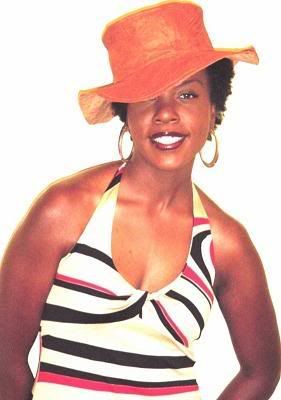
Although they complement our straightened hair to our faces, whites secretly laugh at us for spending so much of our time and money trying to look like them.
When I was single, I couldn't let a woman with Braids walk by without at least learning her name and complimenting her hairstyle. Braids are THAT compelling.
 . . .
. . . 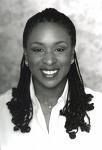 . . .
. . .  . . .
. . . 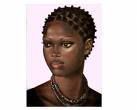 . . .
. . . 
Girl, those Braids are sexy!
I once went out with a woman who had long, beautiful braids when I met her. I found her irresistable and I told her so, because she had the uniquely beautiful curves of an African woman and long flowing braids that reminded me of our culture and our ancestors.
But, then she straightened her hair. She became afraid to come with me to the beach or get near ocean-spray, because the forces of nature would make her chemically-treated hair would revert to its natural curls. She no longer wanted to learn to swim or take long walks on rainy days. We broke up, because she was no longer the woman I had met.
But, then I married a woman with lovely dreadlocks who loves the ocean as much as I do, confident that her African-Braids are impervious to water, even after three hours of splashing in the waves.

My Wife, Teresa Francisco Holland
My wife tells me that constantly combing, heating and chemically treating Black hair causes much of it to fall out, preventing it from reaching the length and beauty that it otherwhise could. She says that hear in Brazil, many white people believe that Blacks' hair doesn't grow, because many Blacks here treat their hair so harshly that it usually is unable to grow as much as it naturally would. Black hair styles are much healthier for our hair.
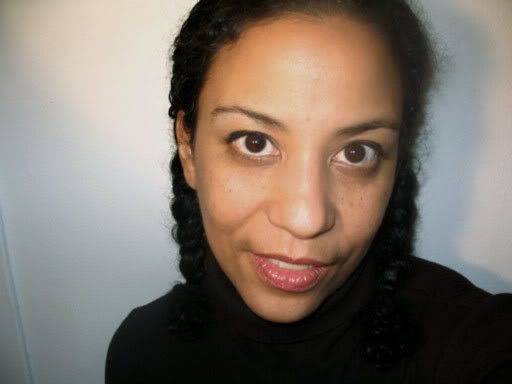
Liza Sabater, blog Diva of Culture Kitchen, says, "I like my braids because they startle people."
I moved to the Bahia state of Brazil precisely because there is a Black majority here, where we revel in Afro-Brazilian culture. In Salvador, the capital of Bahia, Afro-Brazilian women and girls can be seen setting up stools on the streets where they braid women's hair. It's part of the beauty of being Black.
Aside from African Braids being impervious to water, African Braids have another advantage: Once braided, they last for over a month without additional maintenance. For Black women on the move, a savings of an hour or per day in the hair care area is no inconsequential thing.
When a female relative was in law school, she asked me to recommend time-management techniques that would allow her to graduate from an Ivy League law school with excellent grades. I recommended that she save an hour of time per day, or more, by getting her Braided just one every month to six weeks, thereby waking up every morning "good-to-go," without hair care concerns.
She got her hair Braided, received many complements for it, and now she is a lawyer making the big bucks at a well-known law firm. During her three years at law school, she saved perhaps 1000 hours and $4,000 dollars that she would otherwise have spent at beauty salons trying to have white hair - time and money that never would have been returned to her.
Bronze Trinity says:
. . . What a great article! I have many hair magazines written by women, but never an article by a Man! I wonder how other men think? I know that a lot of them hate weaves for sure though.
I see myself having dreads one day (my Mom will get used to it). I have noticed that a lot of Women in the AfroSpear have natural hair. I guess that comes from feeling comfortable with yourself, knowing who you are, being proud or your culture, and not being afriad to not fit in with Euro-American ideals. I think as an educated person who wants to be a role model, I have to show young girls that it is okay to be natural and it is beautiful.
As for the money issue, I have spent hundreds of dollars each year on hair products and procedures including gels, relaxers, hair relaxing shampoos and conditioners, flat iron sprays, hair colour, hair moisturizers, reconstructors, and detanglers all to deal with my relaxed hair and the damage caused by it. If I had dreadlocks I could throw most of that stuff away.
I suppose it took all of my many years of education to come to this point. I had to get away from elementary and highschool people who used to call me Medusa when I had plats, and who made fun of my hair when it was short and curly. It was so unpleasant having natural hair back then because I was teased horribly.
I think now is a safer and better time to be natural. I guess you have set up a challenge for me? I have to actually get my hair done soon, by a new hairdresser and I'll talk to her about getting dreads. I like your wife's hair. I think I would like thin dreads that I can swing around and maybe never have to go to the salon ever again! Bronze Trinity
Ask yourselves this: How much money and time would you save every month if you wore an Afro or got your hair braided into long flowing braids once every six weeks? How much time and money could you save if you had dreadlocks and never had to go to the beauty salon at all? If saved that money over time, wouldn't it eventually be enough to put one child through college? And isn't this an expense that white people don't have, precisely because they are not trying to be like us?
When you think about, when whites convince us to spend an hour a day trying to make our hair straight like theirs, they hobble us just as surely as the slave owners did by cutting off our toes. There's no way we can achieve as much as they do in education and business if we waste an hour in a futile battle to make our hair become and stay like theirs.

And let's face it: One of the most common ways that we Blacks abuse our children is by dragging hot irons through their hair, often burning their scalps permanently and leaving brands of cultural servitude on their foreheads necks and ears. We teach them early on the "value" of suffering while trying to be white.
 . . .
. . . 
I once went to a small hippy free school with a boy who had some African blood, whose hair was not as curly as mine and not as straight as white people's hair often is. We were best friends and never concerned ourselves with our hair, because we were too busy unselfconciosly playing. But, as soon as my friend aged out of the free school and began attending an all-white suburban junior high school, he suddenly expressed an anxious desire to straighten his wavy hair. Certainly, some of our boys learn to feel inaquequate among whites because their hair is curly, but many boys and men proudly are wearing braids, and some of their white classmates are following suit.
 . . .
. . .  . . .
. . . 
Whites know that our culture is vibrant, so many of them eventuallly adopt our language and culture (e.g. rap music) whenever we display it to them long enough.

Part of the cultural revaluation of Black people must be a revaluation of our natural hair. White people will never respect us and we will never respect ourselves as long as we allow our hair and our skin to be defined by others and by us as inadequate, inferior, ugly . . . Black is beautiful. You and I know that, and white people who don't know it are never going to be convinced by us spending an hour at the hair salon.
And we need to be clear about this: straightened hair is white people's hair. When we straighten our hair chemically or with irons or however, we are straining to be like white people in a way that will NEVER be successful. When we get off of the hair-straightening merry-go-round, we immediately become successful both in terms of maintaining our hair and in being who we culturally and historically are. Black Natural is the new cultural aesthetic chic.

Although imminently practical, wearing Afros or braids or dreadlocks is not culturally easy in a society dominated by white people, white-media and white-thinking, even in the Black community. Many of us have been brainwashed into thinking that "white is right," even to the degree of "whitening" our hair and our skin. After having this drummed into us by parents, relatives, friends and the constant anti-Afro drumbeat of the white media, it takes a revolutionary spirit and immense courage to finally say, "Oh, Hell no!"
Many who read this are asking, "Where is that M-F Francis L. Holland, so I can strangle him? He's attacking everything I've learned about the emulation of white people!" But, you're also asking, can I be beautiful without straight hair. To this Black man, you are beautiful already, but you will be more beautiful still when you are more authentically Black and more practical about the impossibility of being white.
Ask youselves, "Would you rather have a real Rembrandt painting or a fake Renoir?" "Real" is always more valuable than an imitation, even when it comes to hair. Your real Braids and Afros and dreadlocks are more valuable to me because they genuine, not fakes, not easily-discovered imitations of something else. Black women are more beautiful than white women when Black women are authentic, but when they straighten their hair, they risk visually becoming merely cheap (yet financially expensive) copies of white women, surrendering their natural beauty in exchange for a plastic copy of someone else's beauty. Real is better, in my book.
I am NOT saying that their is a haircare code of conduct within the Afrosphere, because the Afrosphere, like the African diaspora is immensely diverse and embraces everyone who believes if Black self-determination. This essay is not written to castigate or infuriate anybody, but rather to help men and women in the Afrosphere who are struggling to adopt a new pro-Black consciousness, even in the context of an anti-Black society.
White people really will respect us more when we respect ourselves, and when we take a principled stand and stick to it. Rememeber the Civil Rights Movement? Of course, if we start wearing Afros and African Braids, they will take this as a revolutionary statement that we are rejecting white culture and anti-Black propaganda. But, isn't that what the Afrosphere is about? Enough is enough! It's time to give up trying to be like whites and excel at being ourselves!
If any reader has never taken the radical Blafrican step of wearing his/her hair in Braids, an Afro or dreads, please try it and submit a photograph of yourself for me to post at my blog by e-mailing your photograph to francislholland@yahoo.com. If you already wear your hair in Braids, DreadLocks or an Afro, please submit a foto at francislholland@yahoo.com, so that your African beauty and courage can be an inspiration to others in the Afrosphere.
(I have written the word "Braids" with a capital "B" above to indicate a new respect for our own African hairstyles, but also because capitalizing the word "Braids" will annoy white people almost as much as their behavior sometimes annoys us.)



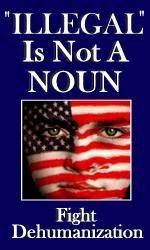

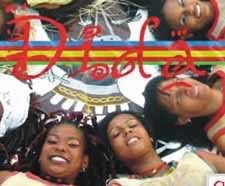


9 comments:
thanks for the insightful and liberating post: my wife has kept my daughter's hair natural and she usually wears it Braided. my sister wears her hair natural and in twists (now, for over 10 years)!
i'm still working on my wife, who insists on getting a "touch up" every 6-8 weeks (depending on new growth).
Francis, you've done a tremendous job of speaking with your true voice in this blog, i will definitely add it to the BlogRoll over at plezWorld!
Thanks, Plez!
I'm really glad to see that you identified with this and that you, too, have found that valuing our natural African hair is a beautiful part of who we are and of what attracts us to the Black women we love.
Thanks for adding me you your BlogRoll at plezWorld and I, likewise, have added you to my "Welcome to the Afrosphere" blog list, because it is apparent to me that you're "down with the Afrosphere".
One love! One Nation Under an AfroSpear!
Oops! I guess I still haven't gotten that "a href" stuff down, but luckily Plez posted a link to his site above!
First off, so weird being mentioned on your blog. Its like thinking your not noticed and then seeing yourself on TV or something bu I really appreciate it. What a great article! I have many hair magazines written by women, but never an article by a Man! I wonder how other men think? I know that a lot of them hate weaves for sure though.
I see myself having dreads one day (my Mom will get used to it). I have noticed that a lot of Women in the AfroSpear have natural hair. I guess that comes from feeling comfortable with yourself, knowing who you are, being proud or your culture, and not being afriad to not fit in with Euro-American ideals. I think as an educated person who wants to be a role model, I have to show young girls that it is okay to be natural and it is beautiful. As for the money issue, I have spent hundreds of dollars each year on hair products and procedures including gels, relaxers, hair relaxing shampoos and conditioners, flat iron sprays, hair colour, hair moisturizers, reconstructors, and detanglers all to deal with my relaxed hair and the damage caused by it. If I had dreadlocks I could throw most of that stuff away. I suppose it took all of my many years of education to come to this point. I had to get away from elementary and highschool people who used to call me Medusa when I had plats, and who made fun of my hair when it was short and curly. It was so unpleasant having natural hair back then because I was teased horribly. I think now is a safer and better time to be natural. I guess you have set up a challenge for me? I have to actually get my hair done soon, by a new hairdresser and I'll talk to her about getting dreads. I like your wife's hair. I think I would like thin dreads that I can swing around and maybe never have to go to the salon ever again!
Thanks, Trinity! You are a very important part of this community and you brought an essential discussion to our attention at your blog!.
A lot of us men think, but too many of us have bought into the white media brain washing that tells us that white people's hair is better. It's NOT better.
I'm sorry that you got teased so much as a child just for being your natural born self. I know that, in spite of how enlightened my church was supposed to be, a minister who had Braids told me that other women expressed displeasure at her Braided hair. They were probably secretly jealous that the Braided-hair minister had an extra two hours and fifty dollars more on Saturday, because she didn't have to waste time in the beauty salon.
I really want a picture of you in your new dreadlocks! When your mother sees how much you love yourself, she'll appreciate that even if she doesn't immediately appreciate how you got there.
Thanks for dropping by! What do you think of the Eddie Griffin (BASG) blog so far? What can I add to it to help it tell the story?
What a wonderfully comprehensive post! Natural hair & positive self image is such a good thing.
It's good to see another Brother coming out of the Matrix!
Peace,
Bygbaby
Great post, Francis!
I go back and forth between braids and straightened hair. For me, it's about fashion more than anything else because I know a number of handkerchief heads who wear braids and locs.
It's unbelievable how threatening black hair can be to some people. In another lifetime when I was a junior associate at a white law firm, I showed up at work one day wearing braids like Susan Taylor's because I thought they looked cute on me. Lord have mercy, you would have thought I came in screaming "Burn, baby burn!" Later that day, the lone black partner was dispatched to have a talk with me.
Fast forward one week later. My braids were gone, my hair was straightened, and I now had a photo of Malcolm X on my desk where none had been before.
The black partner never spoke to me again.
Thanks for sharing your experiences with both straightened and Braided hair, Sonya! It takes a lot of courage to take this on in the context of America, but that's what the Afrosphere is for, to support us in doing the things that we, as Black human beings, have a right to do, like wearing the hair God gave us, if we choose to do so!
I am really proud to participate with you at my blog and in the Afrosphere!
"A Girl Like Me" is the type of videos they should be showing on BET. Ms. Kiri Davis has given us hope for our daughters.
Post a Comment